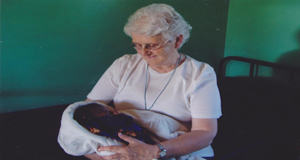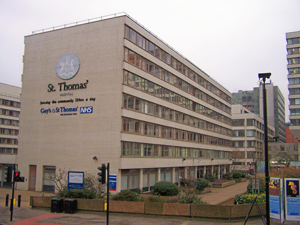September 24, 2018
Mercy Day
Editor: World Day of the Sick is celebrated each year on the Feast of Our Lady of Lourdes, 11 February. This year we invited Assumpta Walsh rsm (GB Institute) to share her reflections of her many years of involvement in the ministry of healing.
 In November 2014 we celebrated the 175th anniversary of the arrival of our Venerable Foundress, Catherine McAuley, in Bermondsey with five Sisters, thus marking the first Mercy Foundation in the UK. We know from reflecting on our early history that these pioneering women not only visited the sick poor in the local Dickensian hovels, but also in the famous hospitals of St Thomas’ and Guys’ as well as branching out to the Crimea with Florence Nightingale.
In November 2014 we celebrated the 175th anniversary of the arrival of our Venerable Foundress, Catherine McAuley, in Bermondsey with five Sisters, thus marking the first Mercy Foundation in the UK. We know from reflecting on our early history that these pioneering women not only visited the sick poor in the local Dickensian hovels, but also in the famous hospitals of St Thomas’ and Guys’ as well as branching out to the Crimea with Florence Nightingale.
Reflecting on my own faith journey I have had the enormous privilege of accompanying the sick in different times and different places. Parish visitation was a definite part of our formation and later we were expected to incorporate this ministry into our normal working week which for me was the classroom.
During a ten year spell in Nairobi working in collaboration with the Mercy Kenyan Province I was requested by the Chaplain of the Mater Hospital to cover the Chaplaincy twice a week.
I also assisted a Maryknoll priest at a hospital for the destitute in the Kibera and surrounding slums.
No amount of book knowledge could prepare one for each day’s ministry and challenge. AIDS was rife at the time and the unwillingness to acknowledge the reality was a huge hurdle. Society operated out of the culture of blame and the sick person was left isolated, alone, guilty and ashamed.
The ministry of the chaplain was a vital link in encouraging the patient to feel the warmth of compassion and helped to believe that he/she was precious and greatly loved by God . Mostly words were unnecessary as silence and the touch of one’s hand restored calm and a sense of acceptance. These were emotionally challenging experiences but always moments of grace believing that each day was according to God’s agenda. By leaving myself open to the present moment I was merely the instrument of peace and compassion for my sick brother or sister.
The role of the chaplain was very varied and one could be called on to attend the mortuary to bless a body and pray with a family who were taking their loved one up country for burial in the father’s farm.
On returning to England from Kenya I was appointed to join the Bermondsey Community which presented me with the opportunity to be available for outside ministry. Through a telephone conversation with the Catholic Chaplain at St Thomas’ hospital I was invited to join the Volunteer Chaplaincy Rota. This was a prophetic calling as I was following in the footsteps of the earlier Bermondsey Sisters who had walked that unmarked road. The Lead Chaplain considered that I had sufficient lived experience to take up my ministry without the mandatory training.
 |
|
Image:Soham Banerjee |
St Thomas’ Hospital is a very large complex and embraces the Evelina Children’s Hospital. Here we work as a Team and duties are allocated each morning which begins with a conference call with the Team working at Guy’s Hospital. There are many obvious differences in working in a small Catholic Hospital in East Africa from that of a huge NHS Trust. The NHS system is mainly short stay and spiritual care is very transitory except in the wards for the elderly whose needs are very different.England has an ageing population with the complications of dementia and serious physical disabilities and these patients do not always have the support of family members.
Learning prayers by heart in one’s youth helps an elderly patient to participate in a Eucharistic Service despite the disadvantage of difficult immediate recall.
We have all been brought up with the precept Honour Your father And Your Mother As The Lord Your God Commanded You. We are called to respect life in all its stages regardless of age or circumstances. Ministering to patients with different levels of mental incapacity calls for patience, time and a listening ear. People with such health issues are often very frightened and struggle to be accepted and understood. In struggling to make a sincere response there are often more questions than answers but it has been my experience that spiritual care has a very positive effect on the elderly and can help to calm a very anxious individual.
There is currently serious thinking in this country that spiritual care is superfluous to the work of the NHS. Now more than ever we have to be proactive as a church in being visibly present with our sick and vulnerable brothers and sisters . Each week as I reflect on my ministry I am deeply touched by the courage , faith and trust in God that vulnerable people show in the face of adversity. Hospital Chaplaincy can be a lonely road as much that one encounters has to stay in the solitude of one’s own heart trusting in the compassion and love of Christ to fill in the short comings in my fragile efforts,because I, too am “A wounded Healer”.
Messages to: Assumpta Walsh rsm